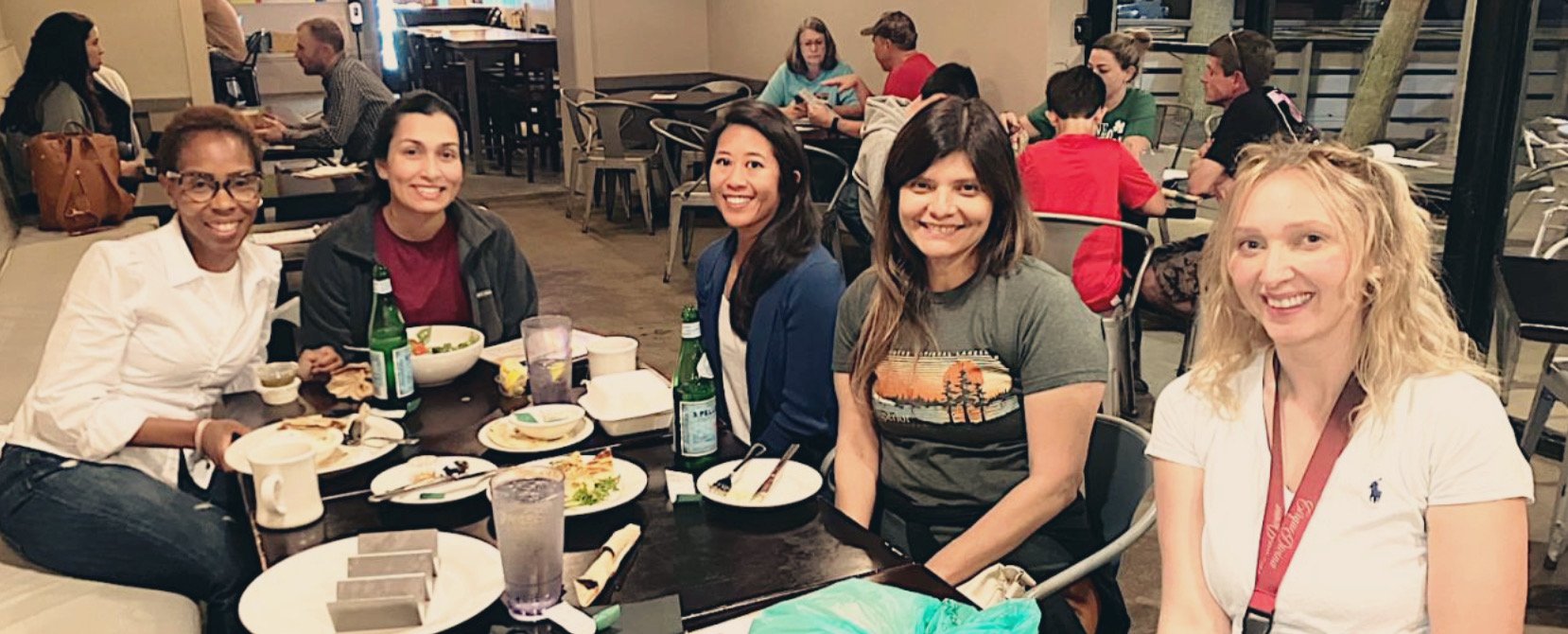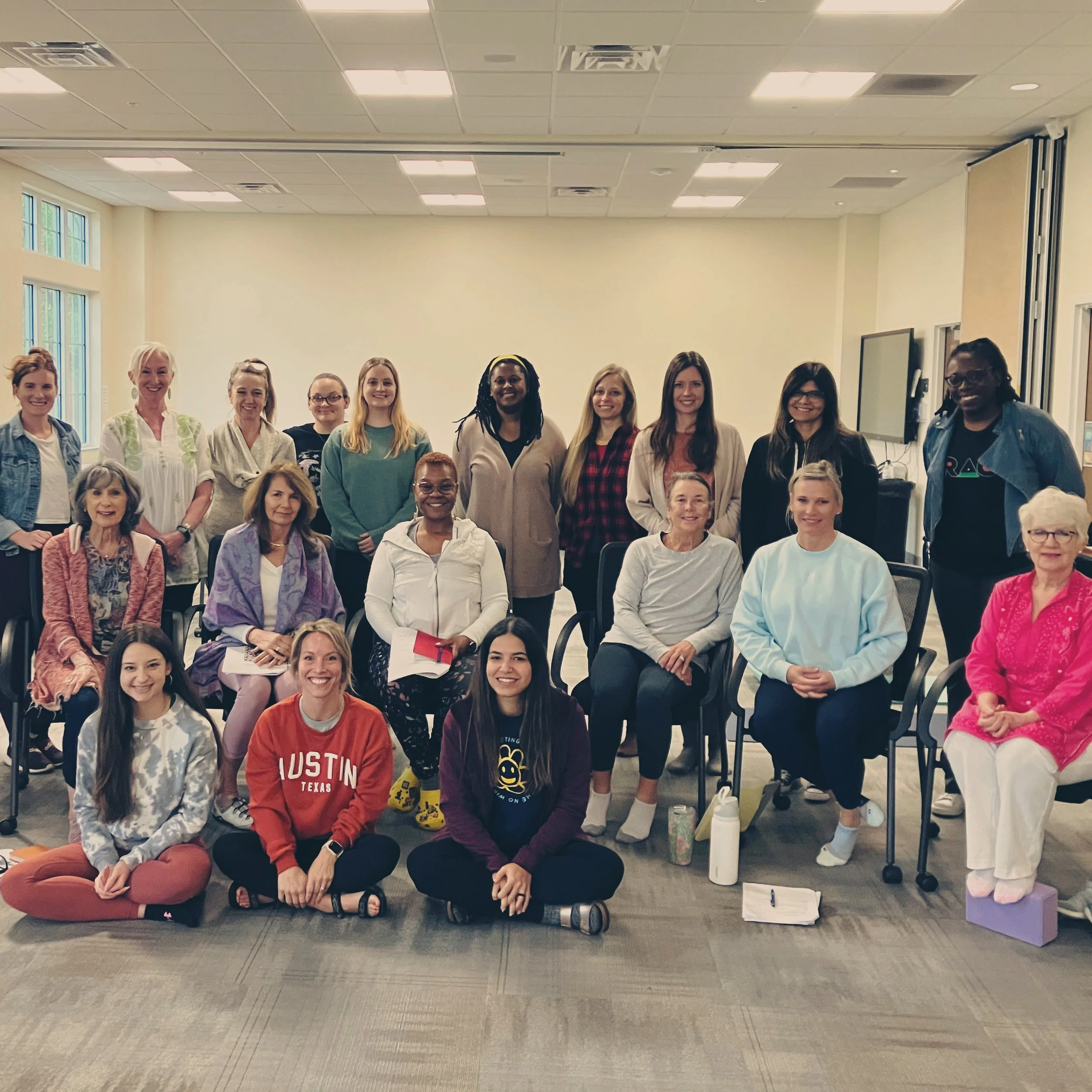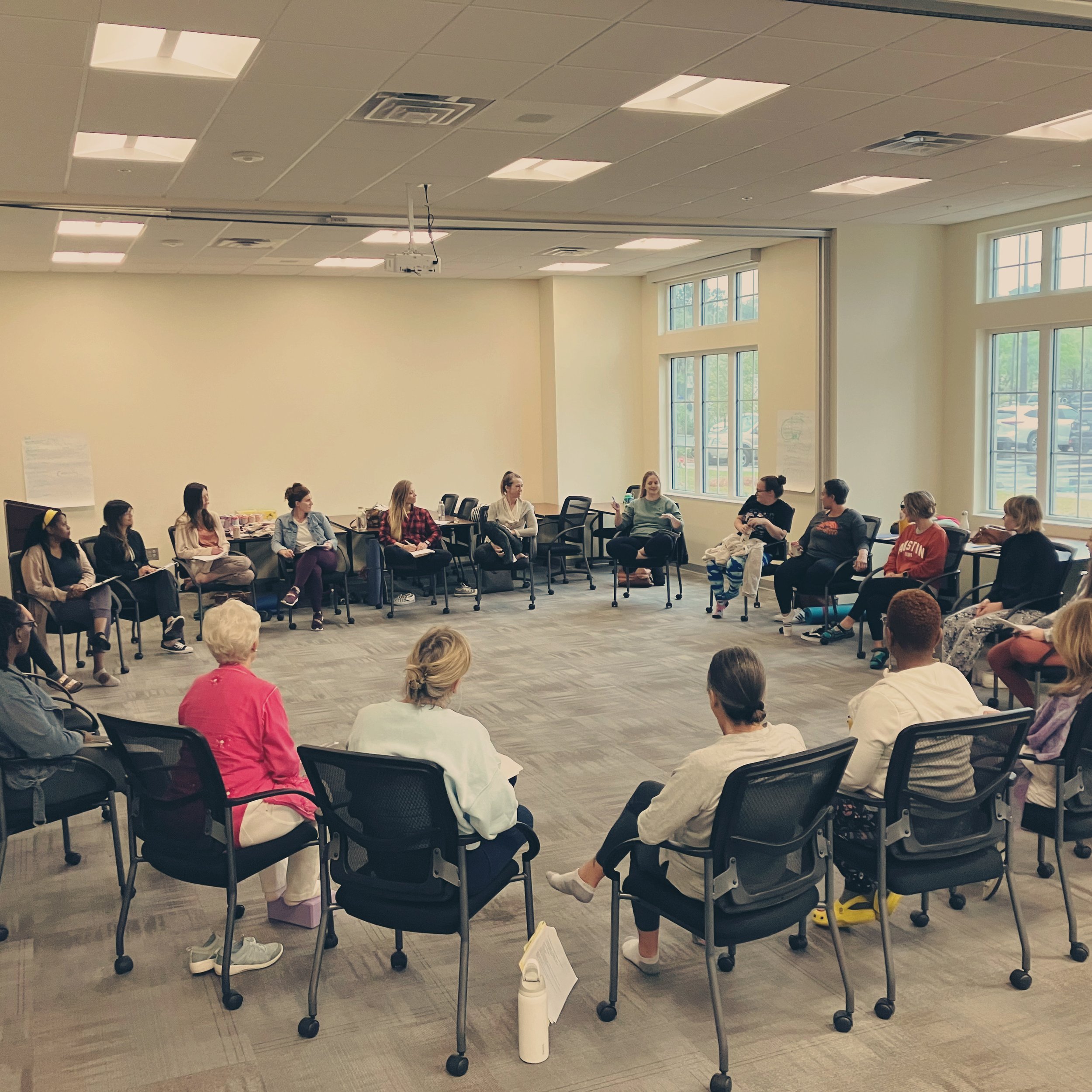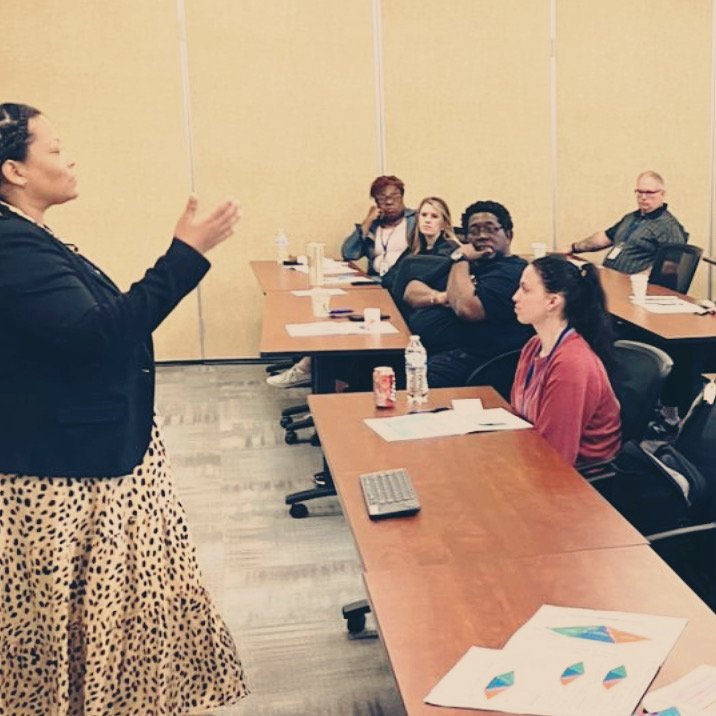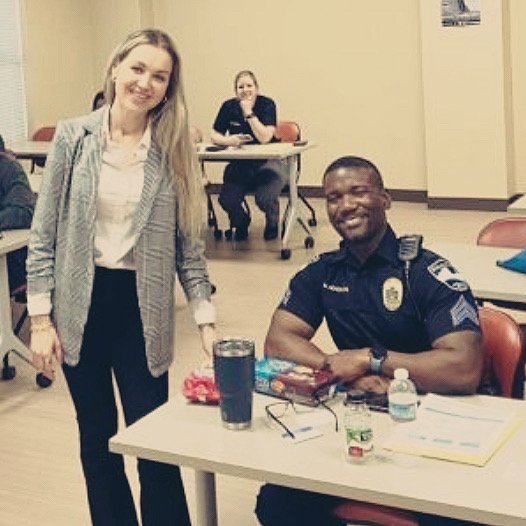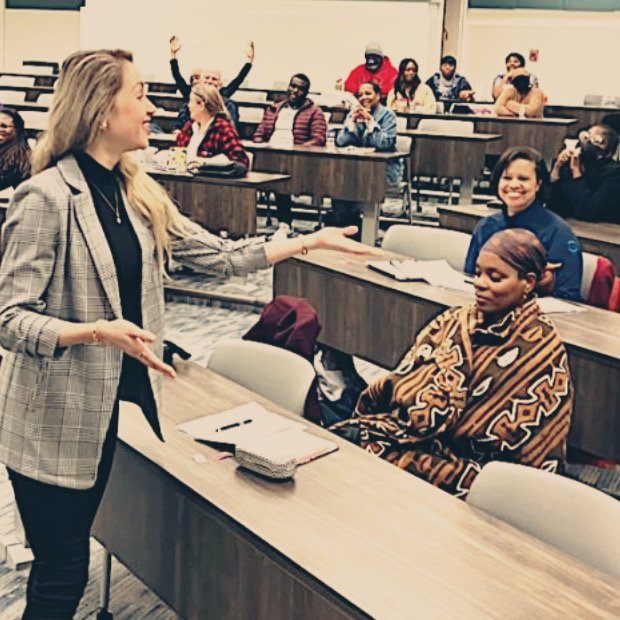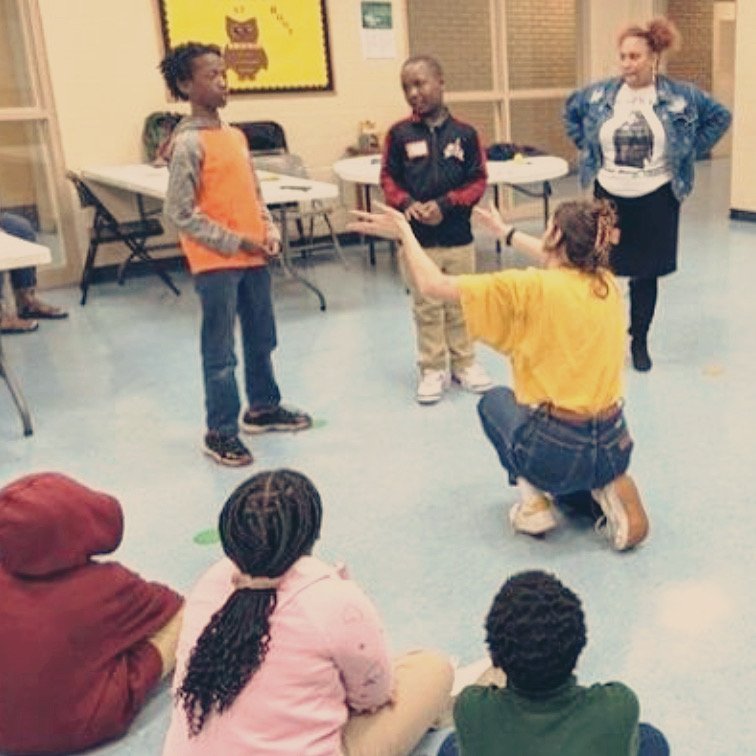By Raquel Issenberg
Trauma is a pervasive issue that affects millions of people around the world, and recovery from trauma can be a long and challenging journey.
Moreover, underserved communities often face numerous challenges that can take a toll on their physical and mental health. The impact of poverty, discrimination, and trauma can result in chronic stress and a range of behavioral health issues. Mindfulness practices, including Trauma Sensitive Yoga (TSY), have shown promising results in helping individuals from these communities self-regulate and tend to their behavioral and overall health.
In this article, we will explore the positive impact of mindfulness practices and Trauma Sensitive Yoga on underserved communities, through the voice of our guest expert, Vira Salzburn, who serves as program director of Safety & Resilience Programs at Chatham County Net Planning Council.
We will look at examples of how TSY and other behavioral care programs are being implemented in real-world settings to improve the health and well-being of individuals in the community.
Guiding leaders
Vira Salzburn’s transformational management style aims to develop new leaders who would provide wellness practices that prioritize safety and empowerment to the Savannah community and across Georgia.
Vira became a passionate advocate for yoga as a tool for healing and building resilience, and she has dedicated her career to making suicide prevention and mindfulness practices accessible to all, especially to individuals who have experienced trauma.
“We help people to self-regulate, connect with others and build trust in their communities and their organizations (…) What I advocate in the community when I apply for grants, everything we do now, is an upstream approach to suicide prevention”, Salzburn explained when looking back at the evolution of community programs in the department she now runs.
Determined to work for a non-profit, Vira came to Savannah seven years ago. Not only did she discover professional fulfillment, but she also found solace in yoga, mindfulness, and self-compassion practices, which provided her with personal healing.
“Previously, I worked for a business, and I really didn’t want to do that anymore (…) Immediately after I found a job, there was an opportunity to become a trainer in suicide intervention. I was also a fitness trainer at a part-time job at Candler Hospital in addition to my regular job, and they invited me to teach yoga to our senior population (Silver Sneakers). But it was after working for two years in suicide prevention that things really started to shift in me”, recounted.
Self-Healing Naturally Extend To Others
In recent years, Trauma Sensitive Yoga (TSY) has gained popularity as a complementary therapy for trauma recovery, and many individuals and communities have found it to be a powerful tool for healing.
Through her work and personal healing, Vira, who’s originally from Ukraine, is creating safe and welcoming spaces where individuals can build resilience and reclaim their lives. Her dedication and passion for making yoga, for example, accessible to all are truly inspiring.
“First I was introduced to yoga years ago in Alabama, in my twenties (…) At the time I was working part-time at a university as an exercise instructor, and I started taking (yoga) classes for flexibility and stretching.
“I was also struggling with eating disorders so exercise was mostly a way to burn the calories only to worsen (my problem). So any exercise that I approached at the time was about pushing, doing more, working hard.”
Her own recovery journey became a source of empathy and understanding.
“Moving to Savannah started my healing process for eating disorders, by doing the work that was meaningful, and by releasing traumas from the past.”, Salzburn reflected.
Vira then took the Stress Management and Resiliency training offered at one of the yoga studios in town, and this course was her introduction to mindfulness with a yoga practice approach.
“I was constantly looking for opportunities to heal and I just didn’t know how to do it.” And that’s when I came across the program Mindful Self-Compassion, so I became a certified teacher.
“With the Mindful Self-Compassion program specifically, I really began to notice something different about myself, my body, etc. And one thing led to another, so I took another certification in Trauma Sensitive Mindfulness.” After that, Salzburn started to explore Trauma Sensitive Yoga.
“When I learned about Trauma Sensitive Yoga and took the course for the training (2020), I was already a facilitator for the Mindful Self-Compassion program, and I wanted to know more about mindfulness and also trauma (…) And one of the things that really transformed the way I was doing work was the book The Body Keeps the Score: Brain, Mind, and Body in the Healing of Trauma by Bessel Van Der Kolk. Those resources were impactful for me professionally and personally because they led me to discover additional ways of how to become trauma-informed.”
Creating Safe Spaces For Behavioral Health
Mindfulness practices involve paying attention to the present moment with a non-judgmental attitude. Trauma Sensitive Yoga (TSY), in particular, focuses on physical sensations and breath work, allowing individuals to connect with their bodies and emotions in a safe and supportive environment.
While traditional talk therapy can be effective in treating trauma, some individuals may find it difficult to connect with their emotions through verbal communication alone, hence mental health and embodied movement are finally finding a bridge.
A certified Mindful Self-Compassion (MSC) teacher and Trauma-Sensitive Yoga (TSY) facilitator, Salzburn is also part of the faculty of the Psychiatry Residency Program at Gateway, where she has been invited to teach yoga at their retreats.
“I just started meeting a lot of yoga people in the community. So at the time, we tucked yoga in the Mindful Self-Compassion program; the idea was to teach yoga and in the process to teach people how to be compassionate with their bodies and themselves.”
This is where Holle Black comes in, an experienced Pranakriya Yoga Therapist and Trauma-Sensitive Yoga teacher. Trained under the guidance of Kripalu’s master teacher Yoganand Michael Carroll, and Marlysa Sullivan, Black fostered the first Trauma-Sensitive Yoga program in town, under Chatham County’s Safety & Resilience Programs.
Having studied with David Emerson, the founder of TCTSY, Black and other colleagues recognized the need for a more tailored approach to yoga for individuals who have experienced trauma, so in 2013 they opened their own project near Atlanta, Centering Youth.
“I met Holle Black in 2020, and it didn’t take much of a conversation… I said, ‘Holle, would you be willing to come to Savannah to facilitate a teacher-training? I would just invite anybody who would like to come, yoga teachers, and not’. And she said yes, so she came the first time in 2021, and then 2022, and 2023”, Salzburn highlighted.
Then, the Trauma Sensitive Yoga (TSY) program was established in Savannah with Black as a lead teacher. This program uses the evidence-based clinical adaptation of a yoga practice designed as a therapeutic intervention for individuals impacted by trauma, including post-traumatic stress disorder (PTSD).
“And at the first cohort we had 16 people, last year 17 people, and this year (2023) we had 20 people. We also proposed to create a Trauma Sensitive Yoga Savannah Coalition, in a way that whoever takes our training we’ll add them to the email list.”, Salzburn added.
And now, Savannah has a growing group of trainers doing the work by creating a safe and supportive environment for individuals to connect with their bodies, build resilience, and promote healing.
“Sometimes I’m criticized for offering everything (the trainings) for free, (arguing) that people need to pay some money so they can invest into it, but to me is about accessibility and equity, and a lot of people —and also speaking from my experience— they simply wouldn’t take the training if it costs a $100, you know? Because what you are already investing is your time, and if we are talking about two or three-day trainings, that’s a lot of time. And also if we are talking about creating equitable, resilient, and sustainable communities we need to spread this resource wide, and then we focus on narrow points: some people like to continue to go deeper and learn more; to gain other skills, to get more training. And if we can support them we’ll do that or maybe they are willing to do it on their own.”, Salzburn asserted.
The grants received are a testament to the positive impact that Mindfulness practices and Trauma Sensitive Yoga classes can have on underserved communities in need of self-regulation, as it helps them progress towards improved physical and emotional well-being.
“This year opportunities came from the city of Savannah to apply for grants for youth violence prevention, and on the state level there were opportunities to apply for grants for innovative ideas related to trauma-informed and mental health practices. So I applied for trauma-sensitive yoga for both grants and I got them both.”
Choice & agency
TSY teachers are trained to create welcoming spaces where individuals can honor their boundaries and build resilience.
Salzburn's leadership style is transformational, which involves empowering and developing followers into leaders. She aims to incorporate trauma-sensitive practices into her leadership approach, ensuring that individuals feel safe, supported, and empowered in groups, teams, or coalitions. This involves promoting key components such as empowerment, choice, agency, peer support, and collaboration, which are integral to creating an inclusive and equitable environment for all.
“We have a team of approximately 30 people. We have ten core yoga teachers that we are contracting regularly. They are the ones that go to the schools, the shelters, and other organizations, and they provide training there regularly. I also communicate (with them) and send out other resources and training opportunities. For instance, a lot of our yoga teachers also took Mindful Self-Compassion training or the Suicide Intervention training, because you may need to have those skills if you work in certain environments.”.
Equity For Yoga Teachers: The Importance Of A Better-Pay
To Salzburn, equity is essential when it comes to the economic remuneration of yoga teachers, who deserve to be better paid than they usually are. Equity means ensuring that everyone is paid fairly for the work they do, regardless of their background, gender, ethnicity, or any other factor that could create bias or discrimination.
Yoga teachers play a crucial role in helping people maintain physical, mental, and emotional well-being. They spend years learning and mastering their craft, and their expertise should be valued and compensated accordingly. Unfortunately, the yoga industry is often characterized by low pay rates, a lack of benefits, and little job security.
“What I mean with that is with our programs, as we work with yoga teachers, and actors through the trauma-drama program, how can we pay them fairly? (…) And what are yoga teachers paid in studios? A lot of times is, like, $20 dollars… So I wanted to make sure we pay yoga teachers better because I think people who are not yogis or teachers might not understand that you continue to do your research and your practice. You’ve taken time to do the training, you create the scenarios of what you’re going to do with the training. (Then) you have to use your vehicle to drive places, and if you’re not doing it as a full-time job but as a contractor, well, it’s a lot of time and resources that you have to spend to do it. And I hope people in our community can understand this and can begin to invest in yoga teachers better.
“I already see this happening, for example, in organizations where the health providers are willing to pay fairly to yoga teachers, to pay them better. To me that’s important. Our yoga teachers are trained in trauma-sensitive yoga, for example, have a specialty and skill set; they know how to create a safe environment, how to facilitate yoga in a way that you won’t re-traumatize someone, in a way as safe as possible for (the population we are serving). So yeah, claim it, own it!”, Salzburn stated.
Growing Roots To Impact The System And Communities
As the Savannah Trauma Sensitive Yoga Program and Coalition, the efforts to create an impact at the state level are indicative of progress. Salzburn and her team at Chatham County’s Safety and Resiliency Programs take pride in their innovative approach of collaborating with yoga instructors, providing them with training, and offering services to multiple organizations in a systematic and organized manner. This sets them apart from others, as they strive to make a difference.
“Thankfully because of the relationship that I was able to establish on the state level through the Suicide Prevention and Mindful Self-Compassion work, through Resilient Georgia (funding that we’ve had for the past three years), this year is a great example of how this is going to move more into the state level. We had in our TSY training representatives that came from other communities, and they are also part of the Resilient Georgia Coalition. I see it continuing to be the trainer provider for anybody in the state. And if we keep getting local and state funding, we can invite people from all around the state to come to take our training with Holle Black, and take the skills back to their communities.”, she elaborated.
Compassionate Beings Building Community
A community that is trauma-informed is a community built on compassion.
“It’s a community where when a person who is in crisis goes to receive services, no matter where they go, if it’s the wrong place that service provider wouldn’t just give them a piece of paper “go somewhere else”. So how can we create organizations in a community where if you identify someone in crisis and help them to connect to whatever the resource they need in a compassionate way.”
It's important to remember that the first idea or solution may not be perfect. Furthermore, Salzburn understands that nothing in life is permanent, and everything is subject to change. Life and work “can be messy, even when we're doing our best.” However, if we approach work with compassion and good intentions, that in itself is a significant accomplishment.
“Because programs and projects have a start and an end. People change, people move on, and that’s Ok. We will continue looking for resources to build and support people. Because ultimately it is about meeting our needs as individuals, families, communities, and the planet… What do we need? Not just to survive but to be happy and free from suffering.”
Resilience building, trauma-informed practices, and mental health education are all trending topics. While it's encouraging that managers are receiving training in these areas, the real challenge lies in implementing and sustaining these practices in the long term.
“We are in the process of setting the tone for a trauma-informed community, but it's merely the beginning, and we have a long way to go. To create meaningful change, policies must be adopted at a systemic level. Only then can we bring about the necessary transformation and create a sustainable impact in the community.”
The Voice Of The Teachers
Meet some of the yoga instructors who, through Safety & Resilience Programs, work with a variety of populations, including survivors of sexual assault, veterans with PTSD, and individuals who have experienced domestic violence. They have seen firsthand the transformative power of Trauma Sensitive Yoga in helping individuals to heal and build resilience.
Yoga teachers in general, not only support individuals but also contribute to the health and well-being of society as a whole.
“I am thrilled to be working with the Chatham County Safety and Resilience Programs teaching yoga to high school students. My goal is to offer a yoga and mindfulness course to build social and emotional balance, increase attention, and build resilience through joyful and engaging practices. Small, consistent groups of youth practicing together provide a platform to develop better relationships with themselves and others.
Trauma-sensitive yoga training has impacted my yoga practice by making me more mindful of my participant’s emotional needs. I am now skilled in how to use trauma-informed yoga techniques while working with youth at risk. I have learned the impact of trauma on the nervous system and how to offer engaging and insightful methods to help people (heal) using yoga and mindfulness. I am thankful for the Trauma Sensitive Yoga training offered through Chatham County Safety and Resilience Programs and for the ability to be able to teach as I complete a master’s degree.”
LEARN MORE ABOUT HER PROJECTS ON ➠ Linkedin
“My experience working for Safety & Resilience as a yoga teacher/wellness provider has been fulfilling and inspiring. The opportunity to teach yoga throughout the community has been a humbling experience. The program has allowed me to teach at places where yoga is usually not offered, so the participants are more curious.
Trauma Sensitive Yoga has made a huge impact on my life and teachings. I have a better understanding of how it affects everyone differently and I am more mindful of this especially when I teach. In my teachings, I’ve noticed how the simple practice of yoga and meditation can make a positive impact on anyone’s everyday life. Because of TSY, I now enjoy teaching and introducing it to places where it is not accessible and to people who have never taken yoga but are willing to give it a try. It’s a good feeling knowing you made a difference in someone’s life.”
“I am so honored to be a part of the Chatham County Safety Net Planning Councils Safety & Resiliency Programs as both a student/community member and guide. The program director Vira Salzburn does an incredible job getting to know all the community guides’ passions and strengths, so she can match them with the most fitting offering. This ensures not only the guide’s comfort but also that community members receive the best care and representation of the programs. All the trainings and workshops I have attended are led by passionate, trauma-informed individuals who make learning fun and supportive.
Trauma Sensitive Yoga (TSY) has created curiosity and growth for me as both a guide and a community member. TSY is a great reminder to offer support, compassion, understanding, and empowerment. Time in a trauma-sensitive yoga class can be a great reminder for community members, they are capable of finding what works best for them both on and off the mat!”
“My experience as a yoga teacher working for Safety & Resilience Programs has been very rewarding. I have had the opportunity to work with a variety of community groups in Savannah, which is my home. I am able to see my city in a whole new and different way. I am no longer one who is just passing through to get to my destination but now I am a part of a vested team who are charged with bringing healing and wholeness. Our team has taken on the mission to embed trauma-sensitive yoga in all our communities, a task I believe is transformative. It’s a joyous feeling to know that I can share my passion for movement as a means to heal and restore my city.
Trauma Sensitive Yoga (TSY) has forever changed the way that I teach movements and postures. The TSY teaching style allows me to invite the participant to have more freedom in movement, letting go of the notion that “I need to get it right”. In a TSY class, I use an empowering, show-and-tell teaching style, instead of a commanding tone which is used in most traditional yoga classes. My teaching style allows participants to freely make choices. I use invitational language allowing participants to try yoga with me. I am in constant motion with the participants while directing them on how to get in and out of different postures safely. I also use tools such as yoga picture cards, a breathing ball, a chime instrument, and sensory toys in every session, in order to enhance the therapeutic aspects of the practice.”
A Wealth Of Resources To Become Involved!
Explore the Safety and Resilience Programs, designed to provide the community with accessible and affordable resources to build resilience and address physical, emotional, and mental well-being. This list offers a range of training opportunities, and you can get involved and support your community by participating in these initiatives!
ASIST – Applied Suicide Intervention Skills Training
A two-day interactive workshop in suicide first aid. ASIST teaches participants to recognize when someone may have thoughts of suicide and work with them to create a plan that will support their immediate safety.Suicide Prevention Training
Suicide Prevention Training (SuicideTALK, SafeTALK, Q. P. R., and School Suicide Safety and Resilience) is an evidence-based gatekeeper training that helps participants recognize early signs of a suicide crisis and take the first steps toward prevention.Resilience Enhancement And Learning (REAL) Programs
REAL training programs use evidence-based/informed skills-building training to create trauma-responsive and resilient individuals and communities.
—Community Resiliency Model (CRM)
—Resilience Enhancement & Leadership Model (REALM)Mindful Self-Compassion (MSC)
MSC is a community-wide evidenced-based program working to build resilience and enhance emotional well-being by providing training and resources to the public for learning and practicing mindfulness and self-compassion.Front Porch A.C.T.S. – Adolescents And Children Transforming Savannah
Front Porch ACTS is a community-based program that uses the evidence-based Trauma Drama curriculum--an immersive theater-based group intervention--designed to integrate the core components of complex trauma intervention with at-risk youth and adolescents.Trauma-Sensitive Yoga (TSY)
The Trauma-Sensitive Yoga (TSY) program uses the evidence-based clinical adaptation of a yoga practice designed as a therapeutic intervention for individuals impacted by trauma, including complex trauma and post-traumatic stress disorder (PTSD):—TSY for Children & Youth uses mindful movement and activities to help children build the skills of self-awareness and emotional regulation.
—TSY for Stress Management and Burnout is designed to help participants reduce stress and elicit the relaxation response physically, emotionally, and mentally through gentle movement, focused attention, and breath work.
—Chair TSY uses modified yoga poses so they can be done while seated in a chair to make practices accessible to people who cannot stand, lack the mobility to move easily from standing to seated to supine positions, or do not have a yoga mat.
The images are provided by Safety & Resilience Programs, the yoga instructors featured in this article, www.centeringyouth.org, and The Imperfect Pose LLC.




